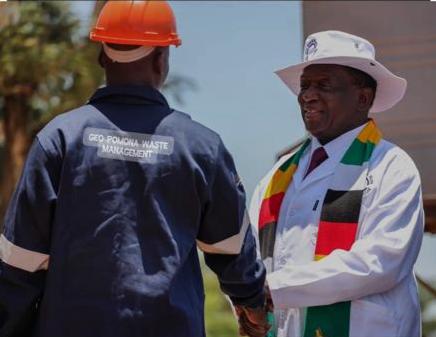President Emmerson Mnangagwa says waste is now a valuable commodity as it can be used to generate electricity and reduce air pollution, which is a significant step towards tackling the country’s waste management concerns and enhancing environmental sustainability.
Speaking at the groundbreaking ceremony for the multi-million-dollar Geo-Pomona Waste-to-Energy Project in Harare this week, the President praised the company for its commitment, as the project will see the construction of a waste-to-energy plant capable of producing 22 megawatts of electricity.
“Through this project, waste is now a valuable commodity that will provide throughput to the plant, while improving overall sanitation and hygiene in the City of Harare. The undesirable landfills, including the resultant ground and air pollution, should now cease to be a public, health and environmental challenge.
“More importantly, the conversion of waste into energy remains a critical component of reducing greenhouse gas emissions, and thus, an important intervention with regards climate change mitigation,” President Mnangagwa said.
The development of this programme in the country is an important step towards aligning Zimbabwe with global waste management trends, as much garbage is becoming more valuable as the world’s resources become increasingly scarce, and there is a rising need to identify new sources of materials.
Metals, polymers, and paper are among the many commodities that can be recovered and reused from waste.
The Pomona project is scheduled to be built in a single phase, although it is expected to be a continuous process until it is operational.
According to Global Data, a company that specialises in monitoring power plants around the world, the project will begin in 2024, with commercial operations beginning in 2025.
The plant will have a capability of using 1000 tonnes of garbage to generate energy, considerably improving the country’s power supply and adding to Zimbabwe’s more robust and stable energy infrastructure.
Countries around the world, including Denmark, Sweden, and Japan, are converting waste into power energy, also known as waste-to-energy (WTE) or energy-from-waste (EfW).
WTE plants can create electricity, heat, or both by converting waste, such as municipal solid waste, industrial waste, and hazardous waste, into usable energy.
Denmark is a world pioneer in WTE, having used the technology to generate power since the 1980s. In Denmark today, nearly 40 WTE plants generate over 50% of the country’s electricity.
Sweden is another country that has made significant investments in WTE, with the objective of sending no more than 1% of its trash to landfills by 2020. Today, over 99% of Sweden’s trash is burned, and WTE accounts for around 20% of the country’s electricity generation.
Japan is also a key player in the WTE business, with over 1,200 WTE units producing around 10% of the country’s electricity.
The Pomona project, located at the former Pomona dumpsite, is an important step for Zimbabwe in its commitment to environmental conservation and energy generation. It is also aligned with the country’s Integrated Waste Management Plan of 2014, in which this project emphasises the integration of waste management practises to achieve a secure, sustainable, and environmentally friendly solid waste management system.



